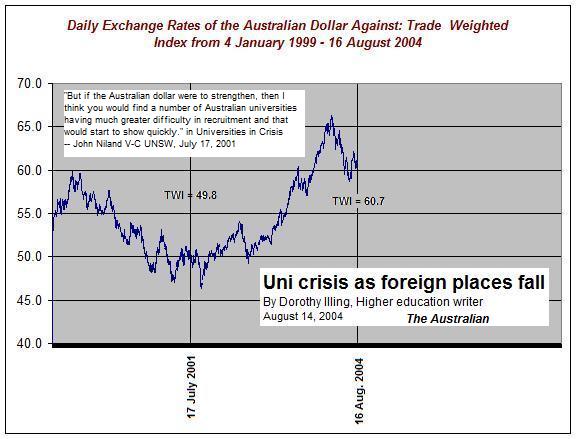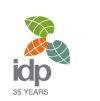
|
News & Views item - February 2005 |
![]()
 Australian
Universities' Global Student Recruitment Company IDP Education Australia
Continues to writhe Under its Financial Problems. (February 9, 2005)
Australian
Universities' Global Student Recruitment Company IDP Education Australia
Continues to writhe Under its Financial Problems. (February 9, 2005)
Over the past year IDP, the principal instrument through which Australia's 38 public universities recruit undergraduates from overseas has been in severe financial difficulties, and the universities to which it is responsible have had to kick in to keep it afloat. According to The Australian's Dorothy Illing, "The not-for-profit global company faced a cash-flow crisis last year, prompting a round of cost-cutting. Seven overseas offices were closed and 60 staff made redundant before universities mounted a rescue bid just before Christmas. They pledged between $6 million and $7 million, mostly in interest-free loans over two years. Professor Bradley [newly installed IDP president] said about half that money had come through so far and she was confident the rest would follow."
On July 17, 2001, John Niland, then Vice Chancellor of The University of New South Wales told the Senate Employment, Workplace Relations, Small Business and Education References Committee.
Australian universities have, as I said earlier, done a remarkable job in promoting the recruitment of international students. It is to our great advantage that we continue the tradition of the Colombo Plan, and for years ahead we will have graduates of Australian universities serving in governments and ministries in the region and offshore. But a lot of our ability to sustain what we do is based on the weakness of the Australian dollar [our emphasis]. Just one observation I would like to leave with you is that, if the Australian dollar recovers to the point that a number of analysts are beginning to forecast that it will, then I believe that will be a major issue that we have to encounter, because so far whatever press has occurred has been muted -- in its advantage to the Canadians, the Brits and others who are looking to recruit -- by the weakness of the Australian dollar. But if the Australian dollar were to strengthen, then I think you would find a number of Australian universities having much greater difficulty in recruitment and that would start to show quickly. There is no issue in our underlying budgetary well being that could change so quickly as the enrolment of international students from one year to the next. That is where I think our greatest risk lies.
Just over three years later Dorothy Illing wrote in the August 14, 2004 Australian, "Uni crisis as foreign places fall".
Applications from overseas students wanting to study at Australian institutions fell 10 per cent in the first six months of this year compared with the same period last year.
Fees from overseas students are the biggest single source of private revenue for universities, making up 13 per cent, or $1.4 billion, of their total income last year.
As their proportion of government funding declines, universities have become aggressive in their recruitment of Australian and foreign fee-paying students to plug the gap.
But increased competition from other countries in a number of key markets, a rise in the Australian dollar, the SARS scare and higher fees have dampened demand.
In particular, Canada, Britain, the United States and New Zealand have been actively recruiting in Australia's established markets in southeast Asia.
The slide has been exacerbated by countries such as China, Malaysia and Singapore building up their own education export industries.
And again on December 9, 2004 Dorothy Illing reported:
Slump in overseas students hits recruiterFOREIGN demand for places at Australian universities has slowed so much that the body recruiting students to study here has began shutting overseas offices and slashing staff.
At a special board meeting last night, IDP Education Australia's South African office, which employs eight people, was told it would close before Christmas. A number of European offices, including London and Stockholm are also likely to go as the group tries to cut costs.It is understood the board decided the not-for-profit company should focus on its core business -- student recruitment in Asia -- as it faces a drop in demand from overseas students wanting to study in Australia.
:
It is likely to announce later this week that it will also shed staff in Australia. Other offices understood to be vulnerable include Mexico and Brazil.
:
A high Australian dollar, a rise in living costs and an increase in university course fees are contributing to the difficult climate.
And many countries that have been traditional recruiting markets for Australia are building up their own education systems, making it more attractive for students to study at home.
Now in the February 9, 2005 Australian she reports "Denise Bradley, vice-chancellor of the University of South Australia, was installed as president [of IDP Education Australia] on Friday after two high-level resignations. ...Curtin University of Technology vice-chancellor Lance Twomey stood down as IDP president – but will remain on the board – and Lindy Hyam resigned as chief executive after a tumultuous few months." Monash University's vice-president, international, Tony Pollock, is to be acting CEO for the next three months.
Professor Bradley was frank in telling Illing, that universities' and IDP's projections of growth in international students were "too robust. ...Part of the problem is that [universities] continued to project very large growth and built their budgets around that. But we're not doing that."
At the moment the Department of Education, Science and Training and its minister, Brendan Nelson, are doing a Brer Rabbit, "lyin' low and sayin' notin'"